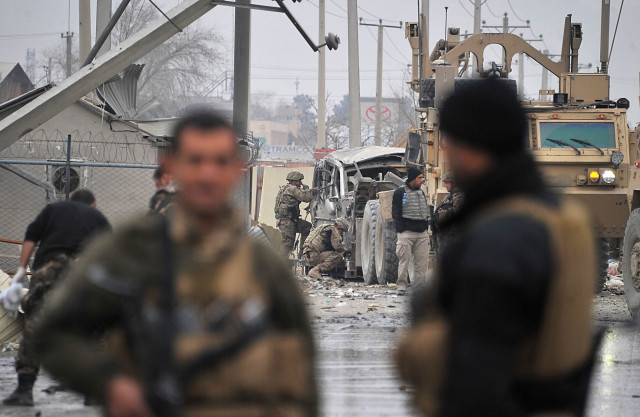Post-2014 Afghanistan: Nato troop pullout to have consequences for Pakistan
Border management at the forefront of new challenges.

Afghan security forces and NATO-led International Security Assistance Force (ISAF) personnel> PHOTO: AFP
The withdrawal of foreign troops from Afghanistan will present a host of challenges and will have consequences for Pakistan which will have to be dealth with collectively.
This was the crux of a discussion at a seminar, “Nato-Pakistan possible partnership after 2014,” organised by the Pakistan Institute of Legislative Development and Transparency (Pildat) in collaboration with the Senate Standing Committee on National Defence on Wednesday.
The international troops’ withdrawal will not be the end of international presence in Afghanistan said Nick Williams, chief of Afghan operation at the Nato Headquarters Operations Division. Williams, who is on a two-day visit to Pakistan, was addressing participants.

“Afghanistan needs help beyond 2014. It’s not a simple end but the beginning of new complexities.” Williams said that international forces intend to remain in the region to develop Afghanistan, provided the Afghan government approves of it, explaining their role will be to train, advise and assist Afghan National Security Forces. “Presently, NATO is negotiating its status with Afghanistan and an agreement similar to the BSA, in terms of jurisdiction and tax is under consideration.”
Speaking of NATO’s contribution over the years, Williams said that NATO had put in place a structure which was not just a matter of spending money but of building capacity. “We will continue to provide practical support to Afghanistan. There are schools built as contributions of the NATO countries,” he added.
While highlighting spillover effects of the withdrawal, parliamentarians present at the event raised concerns over border management amongst other issues. With thousands of Afghans expected to cross the border during the transition period, Pakistan either being a host country or a transit state is expected to confront several challenges. Williams said that ISAF would have to set up border coordination centres in close coordination with Pakistan where the military can exchange information.

Senator Mushahid Hussain, chairman of the parliamentary committee said mistakes from the 1980s should not be repeated. “The international community has not fully done their homework on the mechanics of the withdrawal.” He also stated that there was a growing sense of regionalism. “South Asia is no longer geographical, it’s geo-politically moving close.”
Gilles Vander Ghinst, head of Partners across the Globe section at the Political Affairs and Security Policy Division, said that misunderstandings and evident trust-deficit between Pakistan and NATO must be worked upon. “It is important to draw lessons from the past and relations between the two must be strengthened for better cooperation.”
Meanwhile, Szabolcs Takács, the Hungarian deputy state secretary, while addressing participants at another event organised by The South Asian Strategic Stability Institute (SASSI) University and International Centre for Democratic Transition, Hungary said, “Nato and its partners will continue their commitment to Afghanistan, pursuing the same fundamental objectives that always underpinned the mission: to ensure that the country never again becomes a safe haven for international terrorists.”
A federal minister at the SASSI event commented that it was about time that Pakistan-Nato relations were redefined along new parameters. Ambassador Istvan Gyarmati, chairman UN Secretary General Advisory Committee on Disarmament, stated that Pakistan and Nato need to come up with a concrete memorandum of understanding in order to work together in various fields.
SASSI Director General Dr Maria Sultan said that continuous shift in US policy towards Af-Pak had serious implications for Pakistan’s internal stability.
Published in The Express Tribune, February 14th, 2014.



















COMMENTS
Comments are moderated and generally will be posted if they are on-topic and not abusive.
For more information, please see our Comments FAQ